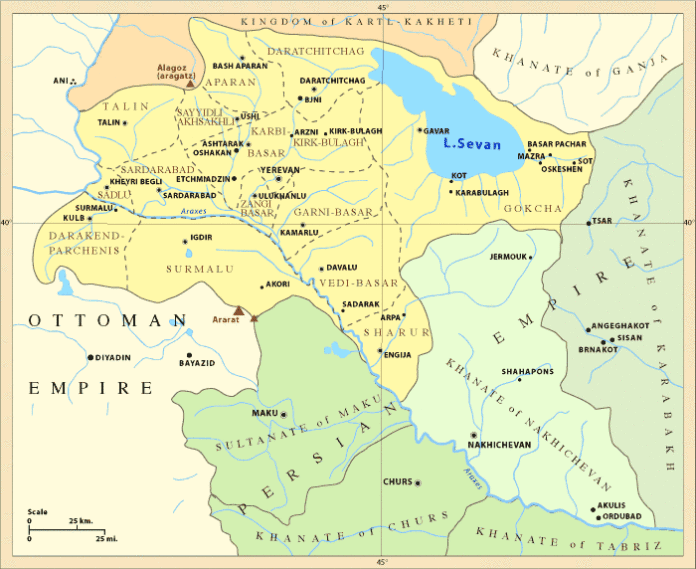According to Ivan Shopen’s (Chopin) statistical account of the Yerevan Khanate – “A Statistical Survey for the Administration of the Armenian Province” (in Russian – «Камеральное описание Армянской области»), the total population of the khanate was 115.106, of which Muslims- 49.872, Armenians- 65.234.
The Muslim population of the khanate consisted of Persians (Shii), Kurds (Shii and Sunni), and Turkish nomads. The majority of the Muslim population was Kurds. After the Russian conquest of the khanate, 14.500 Kurds, mostly Sunni, left the area, while nearly 11.000 remained. Almost all the Kurds who left the area were Sunni. All Yezidi Kurds of the khanate – remained.
Shopen stayed three years in Yerevan (1829-1832) and prepared the first statistical account of the area based on Russian military figures, interviews with the population, and the Persian tax records of the previous administration.
The total number of Kurdish nomads in Yerevan khanate in Persian times exceeded 25.000.
– Shii Kurds –
Tribe Families Population
Karachorli 646 3.120
Melli 349 1.952
Piusan 143 719
Kolani 63 389
Ali-Khanli 45 255
Total 1246 6.435
– Sunni Kurds –
Tribe Families Population
Jalali 378 1.824
Biryuki 277 1.296
Radikanli 72 423
Karachorli 20 140
Azizanli 19 80
Delkheiranli 10 63
Banuki 14 57
Giolturi 5 38
Sheikhbizanli 7 32
Milani – –
Sibiki – –
Juniki 8 25
Khalesanli – –
Chakamanli – –
Total 810 3.978
Yezidis 67 324
Total Kurds 2.123 10.737
Thus, according to Shopen, 10.737 Kurds remained in the Erevan khanate following the second Russo-Persian war of 1826-1828.
A history of Eastern Armenia (the Eerevan Khanate was part of it) between 15th century and the Russian conquest (1828) may be divided into five periods (George A. Bournoutian, “Eastern Armenia in the Last Decade of Persian Rule, 1807-1828”, p. 7);
the period of nomadic domination by various Turkic tribes (ca. 1400-1500),
the early Safavid era (1501-1603);
the middle and late Safavid period (1604-1722);
the time of political upheavals and semiindependent activity of former vassals (1723-1795);
the Qajar period (1795-1828).













